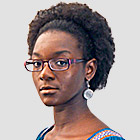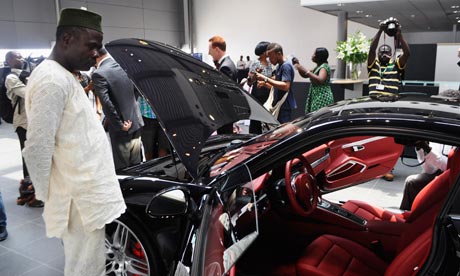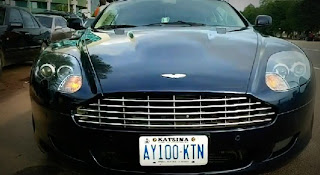NIGERIA: The newest destination for luxury goods including private jets.

Private jet ownership in Nigeria has grown by 650 per cent, from 20 jets in 2007 to over 150 jets in 2012. According to documents sighted in aviation agencies, the development means that wealthy Nigerians acquired, at least, 130 private jets with a sum of N1.02tn ($6.5bn) within the last five years. This put the private jets aviation market in Nigeria (the monetary value of all private jets in the country) at N1.18tn ($7.5bn), using $50m as the average cost of each brand new private jet. A private jet goes for between $40m and $65m, according to the websites of major private jets manufacturers, like Bombardier of Canada; GulfStream and Hawker Siddley of United States; and Embraer of Brazil.
According to findings, the common brands of private jets in Nigeria are Gulfstream 450, 550 and 650; Bombardier Challenger 604, 605; Global Express; Embraer Legacy and Falcons; and Hawker Siddley 125-800 and 900XP. Top aviation officials told our correspondent on Friday that Nigeria currently rivalled China as one of the two fastest growing private jet markets in the world. An official with in-depth knowledge of the situation, who spoke under condition of anonymity because he was not authorised to comment on the matter, said most of the jets were bought by top politicians, oil magnates and other business moguls in Nigeria.
He explained that the economic downturn in Europe and the United States had made Nigeria and China to become two of the fastest growing private jet markets in the world. He said, “Two countries buying private jets now are China and Nigeria. Europe and America are going through turmoil; so, their people are no more buying. This accounts for the trend that whenever some of the private jet manufacturers develop any new jet, they take them to Nigeria and China.”
“The private jets in Nigeria are owned by top politicians, oil magnates and business moguls. It is difficult to get the real identities of owners of some of the private jets in Nigeria because they buy them through some foreign companies in North America, especially the US. The foreign company then leases it to another company in Nigeria.”
Investigation by our correspondent also revealed that there were still several private jets on order by wealthy Nigerians. Some of the jets, it was learnt, would be delivered this year, while others would be delivered in 2013 and 2014. A top official of the Nigerian Civil Aviation Authority, who asked not to be named, said representatives of the owners of the private jets on order had already notified the agency about the order. This, he said, was necessary for the purpose of registering the aircraft in Nigeria. According to him, some of the private jets also come with foreign registration credentials.
The Managing Director of Aero Airlines, Captain Akin George, had recently commented on the increasing number of private jets being parked at the Nnamdi Azikiwe International Airport, Abuja. He particularly lamented the fact that most of the private jets carried foreign registration credentials. He had subsequently called on the authorities concerned in the country to make registration processes in Nigeria friendly and attractive. During a recent visit to Abuja, our correspondent observed that over 40 private jets were parked at the terminal.
The CEO of another airline also said that during political meetings or big functions in Abuja, over 50 private jets were usually seen parked at the Abuja airport. These, he said, were different from the ones parked at the Lagos and other major airports across the country. “If you go to the old local wing at the Abuja airport, there is virtually no place to park private jets again,” he said. Just recently, a team of officials from the headquarters of Bombardier in Canada arrived at the Executjets Private Hangar at the Murtala Muhammed Airport, Lagos, to showcase one of their latest private jets, Global 6000.
The team was led by the Sales Director, Africa, Bombardier Business Aircraft, Mr. Robert Habjanic, who said that the team was on a tour of 12 cities in Africa, including Lagos. Habjanic, who spoke with a few aviation journalists, told our correspondent that Nigeria was the company’s largest market in Africa, with about 35 Bombardier-made business aircraft currently flying its airspace. He said the team had also showcased the relatively new business jet in other parts of the world.
He confirmed that “private business in Nigeria has been growing tremendously in the last five years.” He attributed this to the fact that “Nigeria is an emerging market.”
The growth in the purchase of private jets in Nigeria has also led to the development of multimillion dollars private jets hangars, where repairs and maintenance could be done in the country. Some of these include Execujets Nigeria Hangar, Caverton Hangar and EverGreen Hangar, all located at the Lagos airport.
Speaking on the development, industry expert, Mr. Olumide Ohunayo, said, “The economy is expanding, with increasing investments within the country and the region. This will invariably necessitate instantaneous travel that scheduled airlines cannot provide.
Can we add also that Nigeria has become a major market destination for high end smart phones especially the Black Berry brand, luxury cars including Bentley, Lamborghini and other luxury goods. Beauty spas are springing up in every city just as franchise clothing chains are opening shops in malls dotting several cities in the country. Food and beverage companies are also jostling to find a niche in this emerging market of 168 million people with a lifestyle that is not in sync with the nation's economic growth and prosperity. Nevertheless, it is a market worth a try for the business savvy.
Email us on inquiry@ibgnigeria.com if you need local assistance with market entry.
Culled from the Nigerian Punch Newspapers.
Africa's super-rich put their foot down...as Nigeria's mini-elite in Lagos and Abuja enjoy charmed lives.
-
 Monica Mark of the Guardian in Lagos
Monica Mark of the Guardian in Lagos

Porsche has opened a new car dealership in the heart of Lagos' wealthiest district, Victoria Island. Photograph: Reuters
On an otherwise ordinary-looking, potholed street in the district of Victoria Island in Lagos, Nigeria,
is a stone encrusted gate with personalised initials. In the garage
beyond, draped in protective covering, is a fleet of eight sports cars
that include Lamborghinis, Ferraris and Porsches.
"On a typical weekend these guys head to the boat club to board a private speedboat or jetboat to Ilhasa," said Michael (not his real name), a regular at the house of the Nigerian high-society figure, referring to an exclusive beach known as Millionaires' Playground, an hour away from the polluted lagoons of the commercial hub. "There'll be girls in bikinis playing volleyball, barbecues and parties all night.
"On the right Saturday, you can bump into [Africa's richest billionaire, commodities trader Aliko] Dangote having a beach party at Ilhasa. If you're a so-called big boy in Lagos and you don't have a beachhouse, you're kind of whack," Michael concluded, sipping a Hennessey on the rocks inside an exclusive Lagos club.
Welcome to the charmed lives of a tiny elite that make up the super-rich across Africa. While millions live in crushing poverty, breakneck growth across the continent has expanded wealth beyond the traditional circle of government workers – for a lucky minority. This is the market the makers of Porsche hope to tap into, choosing to open its latest showroom on the continent – the first was in South Africa – in Nigeria. In an ultra-modern glass and steel building, the auto maker unveiled its latest Carrera and 911 models. "It's the sports car that can still be used everyday," Africa Porsche director George Willis said.
About 200 Nigerians own the luxury cars, each costing up to $180,000, brand manager Michael Wagner said. Porsche's 4x4 Cayenne is by far the most popular model imported into Africa, suitable for still poor roads. In Nigeria, there are plans for a Porsche racetrack and a Porsche club "where people get together and compare, and go out on drives together", Wagner said, shortly after officials revved the latest Carrera model for reporters and thrilled onlookers, some posing for photographs in front of the gleaming black car. In the sticky heat outside, an employee said owning one of the personalised Porsches he was washing would be "a dream. But I only earn $120 a month," he shrugged.
While Victoria Island is home to some of the planet's most expensive real estate, most of Nigeria's Porsche sales will come from Abuja, the makers believe. In the moneyed capital city, where wedding-cake mansions overlook smooth cloverleaf highways, wealth is a more conspicuous status symbol.
"There's a big market here. For example, I have a Bentley, a Porsche and a Ferrari, so I can easily buy another brand-new one," said one businessman from Abuja who sponsors golf tournaments as a hobby. But he added: "People don't travel by road anymore, they go by air. So the Ferrari in the garage hasn't done 500 miles in three years."
Others brands are also clawing out a slice of the super-rich pie in Abuja. Government fat cats and a new breed of young entrepreneurs flock to the boutique of the designer Chris Aire, a Nigerian who is based in the US. The "king of bling" designs for the likes of Oprah Winfrey and Angelina Jolie, and opened his first boutique in Africa in December.
Expensive spas compete to offer facials that smother pure gold leaf on customers' faces, and gleaming malls are popular with affluent shoppers. There are other signs of the super-rich, even as Africa's inequality gap yawns. Porsche is already planning a showroom in the Angolan capital, Luanda, similarly awash with petrodollars and ranked the world's most expensive city 10 years after coming out of a 27-year civil conflict.
"Young guys with money need cars they can drive every day to show them off. There are cars that can survive potholes and there are cars that can survive potholes in Lagos," said a Nigerian oil worker. "Porsche are going to have to adapt to Nigerian terrain, the same way as Mercedes did [by marketing more off-road vehicles]."
Shopping abroad remains the ultimate social status badge for many. Maddie, 33, from Abuja, who runs a boutique in between having gold-leaf facial treatments, said Dubai was fast edging out European capitals as the destination of choice. "I travel every two months but I couldn't cope with going to London with my two children alone when both their nannies' visas run out. They don't need visas to go to Dubai, so it's easier," she said.
Still, luxury brand retailers are likely to flourish in a country where wealth is traditionally seen as a benefit to the community. "If we didn't have such terrible leaders only concerned with buying themselves things, everyone in Africa would be rich enough to buy designer clothes for themselves and all their friends," said Christina Akinjola, an unemployed secretary, as she stocked up on fake Chanel bags in the car park of a Lagos mall.
"On a typical weekend these guys head to the boat club to board a private speedboat or jetboat to Ilhasa," said Michael (not his real name), a regular at the house of the Nigerian high-society figure, referring to an exclusive beach known as Millionaires' Playground, an hour away from the polluted lagoons of the commercial hub. "There'll be girls in bikinis playing volleyball, barbecues and parties all night.
"On the right Saturday, you can bump into [Africa's richest billionaire, commodities trader Aliko] Dangote having a beach party at Ilhasa. If you're a so-called big boy in Lagos and you don't have a beachhouse, you're kind of whack," Michael concluded, sipping a Hennessey on the rocks inside an exclusive Lagos club.
Welcome to the charmed lives of a tiny elite that make up the super-rich across Africa. While millions live in crushing poverty, breakneck growth across the continent has expanded wealth beyond the traditional circle of government workers – for a lucky minority. This is the market the makers of Porsche hope to tap into, choosing to open its latest showroom on the continent – the first was in South Africa – in Nigeria. In an ultra-modern glass and steel building, the auto maker unveiled its latest Carrera and 911 models. "It's the sports car that can still be used everyday," Africa Porsche director George Willis said.
About 200 Nigerians own the luxury cars, each costing up to $180,000, brand manager Michael Wagner said. Porsche's 4x4 Cayenne is by far the most popular model imported into Africa, suitable for still poor roads. In Nigeria, there are plans for a Porsche racetrack and a Porsche club "where people get together and compare, and go out on drives together", Wagner said, shortly after officials revved the latest Carrera model for reporters and thrilled onlookers, some posing for photographs in front of the gleaming black car. In the sticky heat outside, an employee said owning one of the personalised Porsches he was washing would be "a dream. But I only earn $120 a month," he shrugged.
While Victoria Island is home to some of the planet's most expensive real estate, most of Nigeria's Porsche sales will come from Abuja, the makers believe. In the moneyed capital city, where wedding-cake mansions overlook smooth cloverleaf highways, wealth is a more conspicuous status symbol.
"There's a big market here. For example, I have a Bentley, a Porsche and a Ferrari, so I can easily buy another brand-new one," said one businessman from Abuja who sponsors golf tournaments as a hobby. But he added: "People don't travel by road anymore, they go by air. So the Ferrari in the garage hasn't done 500 miles in three years."
Others brands are also clawing out a slice of the super-rich pie in Abuja. Government fat cats and a new breed of young entrepreneurs flock to the boutique of the designer Chris Aire, a Nigerian who is based in the US. The "king of bling" designs for the likes of Oprah Winfrey and Angelina Jolie, and opened his first boutique in Africa in December.
Expensive spas compete to offer facials that smother pure gold leaf on customers' faces, and gleaming malls are popular with affluent shoppers. There are other signs of the super-rich, even as Africa's inequality gap yawns. Porsche is already planning a showroom in the Angolan capital, Luanda, similarly awash with petrodollars and ranked the world's most expensive city 10 years after coming out of a 27-year civil conflict.
"Young guys with money need cars they can drive every day to show them off. There are cars that can survive potholes and there are cars that can survive potholes in Lagos," said a Nigerian oil worker. "Porsche are going to have to adapt to Nigerian terrain, the same way as Mercedes did [by marketing more off-road vehicles]."
Shopping abroad remains the ultimate social status badge for many. Maddie, 33, from Abuja, who runs a boutique in between having gold-leaf facial treatments, said Dubai was fast edging out European capitals as the destination of choice. "I travel every two months but I couldn't cope with going to London with my two children alone when both their nannies' visas run out. They don't need visas to go to Dubai, so it's easier," she said.
Still, luxury brand retailers are likely to flourish in a country where wealth is traditionally seen as a benefit to the community. "If we didn't have such terrible leaders only concerned with buying themselves things, everyone in Africa would be rich enough to buy designer clothes for themselves and all their friends," said Christina Akinjola, an unemployed secretary, as she stocked up on fake Chanel bags in the car park of a Lagos mall.






Comments